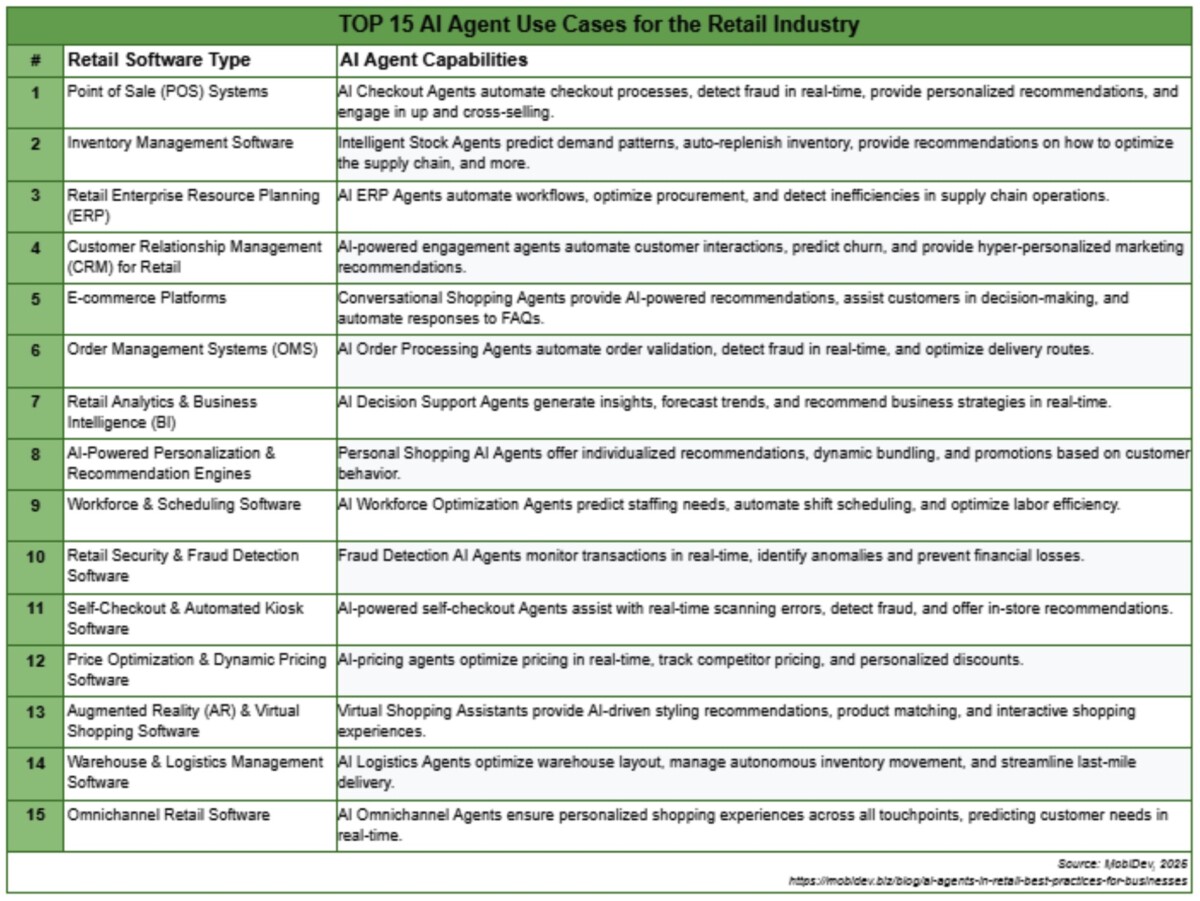Key Takeaways
- Outpace rivals by deploying AI agents to cut routine work, react to demand faster, and turn lean teams into a growth advantage.
- Start with a phased rollout—pilot one high‑impact agent like support, pricing, or stock management, integrate with your POS and ecommerce stack, then measure time saved and lift in sales.
- Elevate your team by offloading repetitive tasks to AI so people can focus on service, storytelling, and smarter decisions that build long-term trust.
- Test dynamic pricing, smart replenishment, and conversational BI to unlock quick wins that are easy to see, share, and scale across the business.
Artificial intelligence (AI) technology is no longer an optional layer of operations; it is becoming the backbone of survival and growth.
Salesforce’s latest Small and Medium Business Trends Report, which surveyed over 3,350 SMB leaders worldwide, revealed that three out of four small businesses are already investing in AI. Some are just getting started, others are going all in.
What do we see on the U.S. market? According to the U.S. Chamber of Commerce 2025 report Empowering Small Business: The Impact of Technology on U.S. Small Business, 58% of respondents use generative AI, up from 40% in 2024 and double the 23% in 2023, and 96% plan to adopt emerging technologies, including AI.
For retailers facing numerous challenges, such as limited staff, supply chain fluctuations, and rising customer expectations, generative AI agents can provide decision support, automate repetitive tasks, and help refocus on growth. SMB retailers cannot afford to lag behind, especially when larger players are using AI to streamline everything from pricing strategies to personalized shopping experiences.
In this article, we will explore how SMB retailers can harness AI agents to drive efficiency, growth, and long-term resilience.
What Are AI Agents and Why Is Their Adoption Critical for Retail SMBs?
AI agents are intelligent assistants that can analyze and act within the retail environment. Unlike traditional automation, which follows static rules, AI agents adapt to real-time conditions.
Instead of viewing AI as a disruptive force, retailers can approach it as a practical tool to scale efficiently. With small teams already stretched thin, delegating repetitive and time-consuming tasks to AI agents creates room for staff to focus on higher-value activities.
Top 15 Retail AI Agents Use Cases
The real strength of AI agents lies in how directly they map to retailers’ pain points.
Basically, you can build an agentic AI solution for any retail use case, but the most popular are presented below in the table prepared by AI agent development experts from MobiDev.

For example, AI checkout agents handle queries about product availability, return policies, or promotions.
Dynamic pricing agents can adjust prices in response to demand, competitor behavior, or inventory levels, allowing retailers to remain competitive.
Intelligent stock management agents can predict demand surges, reduce waste from perishable goods, and coordinate replenishment automatically.
Conversational business intelligence (BI) agents give managers an accessible way to ask, “What were our best sellers last quarter?” and get clear answers without needing complex dashboards.
For SMB retailers, these AI use cases represent not only efficiency gains but also a shield against external volatility. By integrating with existing POS and e-commerce platforms, AI agents provide immediate value without forcing disruptive overhauls.
How SMB Retailers Can Integrate AI Agents
For many small and midsize retailers, the idea of introducing AI agents can feel overwhelming. Budgets are tight, staff have little bandwidth for complex implementations, and wholesale technology replacements can disrupt daily operations. The key is to take a phased approach that builds confidence and delivers early wins.
A practical first step is launching pilot projects in narrow but high-impact areas, such as customer support chatbots or automated invoice processing. These low-risk pilots allow retailers to measure outcomes like time saved, cost reduction, or customer satisfaction before scaling further. From there, SMBs can expand AI use into areas like inventory optimization or marketing personalization.
Another realistic path is augmenting existing SaaS platforms rather than replacing them. Many point-of-sale and e-commerce systems now support AI-driven plug-ins or APIs, making it easier to add intelligence without migrating entire infrastructures.
Measurable Benefits of AI Agents in SMB Retail
Retailers adopting AI agents often see immediate gains in efficiency and accuracy, but the deeper impact is visible in measurable business outcomes. High-tech adopters report stronger sales and profit growth compared to their low-tech peers. For small and midsize retailers where margins are slim, this competitive lift is essential.
One clear benefit is workforce productivity. By handling repetitive tasks, AI agents free up time for staff to focus on customer engagement and sales activities. This trend is reflected in the Chamber’s finding that 82% of small businesses using AI increased their workforce in the past year, countering the perception that AI eliminates jobs. Instead, it acts as a force multiplier, helping businesses grow while creating new roles in management, oversight, and customer experience.
Managing Risks and Regulations
Adopting AI is not without risks, particularly in areas of customer data, compliance, and transparency. The Chamber report highlights that 77% of AI users believe restrictions on the technology would negatively impact their growth, operations, and profits. This underscores the importance of building responsible frameworks rather than limiting innovation outright.
For SMB retailers, risks can be managed through three practical steps. First, data governance policies should be clear and easy to communicate to customers, as transparency builds trust.
Second, cybersecurity protection must evolve alongside AI tools, since any automation that processes sensitive data becomes a potential target.
Finally, SMBs should maintain human oversight for AI-driven decisions for dynamic pricing or personalized promotions, ensuring fairness and ethical standards.
Responsible AI use is not just a compliance checkbox. For retailers, it strengthens brand reputation and helps build loyal customer relationships, both of which are essential for long-term success.
The Future Outlook for SMB Retail and AI
The trajectory of adoption is clear: AI will become inseparable from retail operations. With 96% of small businesses planning to adopt emerging technologies, including AI, the question is no longer “if” but “how fast.”
Future AI agents will go beyond automation and evolve into collaborative partners. They will not only generate insights but also recommend strategies, simulate market outcomes, and help retailers test new product concepts virtually before committing resources. For SMBs, this means access to capabilities once reserved for large chains with deep R&D budgets.
As adoption widens, retailers who move early will establish stronger competitive positions. Those who hesitate risk being left behind in areas like customer personalization, operational efficiency, and financial resilience. AI agents are not a trend—they are the infrastructure of the next generation of SMB retail.
Frequently Asked Questions
Why should Shopify retailers care about AI agents right now?
AI agents are moving from “nice to have” to core infrastructure as more SMBs adopt AI to stay competitive. The article notes strong uptake across small businesses and highlights how agents cut routine work, speed decisions, and support growth with lean teams. If larger retailers use AI for pricing and personalization, waiting widens the gap.
What exactly are AI agents in a retail context?
AI agents are intelligent assistants that analyze data and act in real time, unlike static rule-based automations. In retail, they handle tasks like dynamic pricing, stock forecasting, customer support, and conversational BI. They plug into your POS and ecommerce stack to deliver value without ripping out systems.
Which AI agent use cases deliver quick wins for a Shopify store?
Start with customer support chatbots to deflect FAQs, stock management agents to predict reorders, and pricing agents to react to demand and competitors. The article also calls out conversational BI for fast, plain-language insights like “best sellers last quarter.” These areas show measurable gains in time saved and sales lift.
How do I implement AI agents without disrupting daily operations?
Use a phased approach: run a narrow pilot in one high-impact area, integrate with existing tools, and define a short measurement window. Keep scope tight, like auto-invoice processing or returns FAQs, and review results in 30–60 days. Expand only after you validate ROI and operational fit.
What metrics should I track to prove ROI from AI agents?
Track support resolution time, first-contact deflection rate, stockouts, inventory turns, price change responsiveness, and contribution margin. Pair those with sales lift, AOV, and repeat purchase rate when personalization or pricing agents are in play. Set a baseline before launch so gains are clear.
How do dynamic pricing agents work for SMB retailers?
They monitor demand, competitor moves, and inventory levels, then adjust prices within guardrails you set. The article explains that agents help lean teams stay competitive without constant manual checks. Start with a limited product set and caps on daily price moves to protect brand trust.
Can AI agents really help with inventory and replenishment on Shopify?
Yes; stock management agents forecast demand, flag low-stock risk, and can trigger reorder workflows. The article highlights waste reduction for perishables and better timing on replenishment. Tie forecasts to your sales velocity and seasonality, then sync POs with your warehouse or 3PL.
What’s the role of conversational BI for store owners and managers?
Conversational BI agents answer natural-language questions like “Which SKUs drove margin last week?” without complex dashboards. This speeds decisions for founders and managers who lack time for deep analysis. Use it in weekly ops reviews to guide promos, pricing tweaks, and inventory buys.
How do I manage risks, compliance, and brand safety with AI agents?
Set clear rules: data-access limits, approval workflows for price changes, and tone guidelines for support bots. Start with human-in-the-loop on sensitive actions, then automate once performance is stable. Document decisions, keep an audit log, and review outputs regularly for bias or drift.
What team and tooling do I need to maintain AI agents long term?
Assign an owner for each agent, define SLAs, and schedule monthly reviews of outcomes and failure cases. Keep lightweight SOPs for rollbacks, model updates, and integration checks with POS and ecommerce apps. As the article suggests, integrate agents where you work today so upkeep is simple and value is visible.




